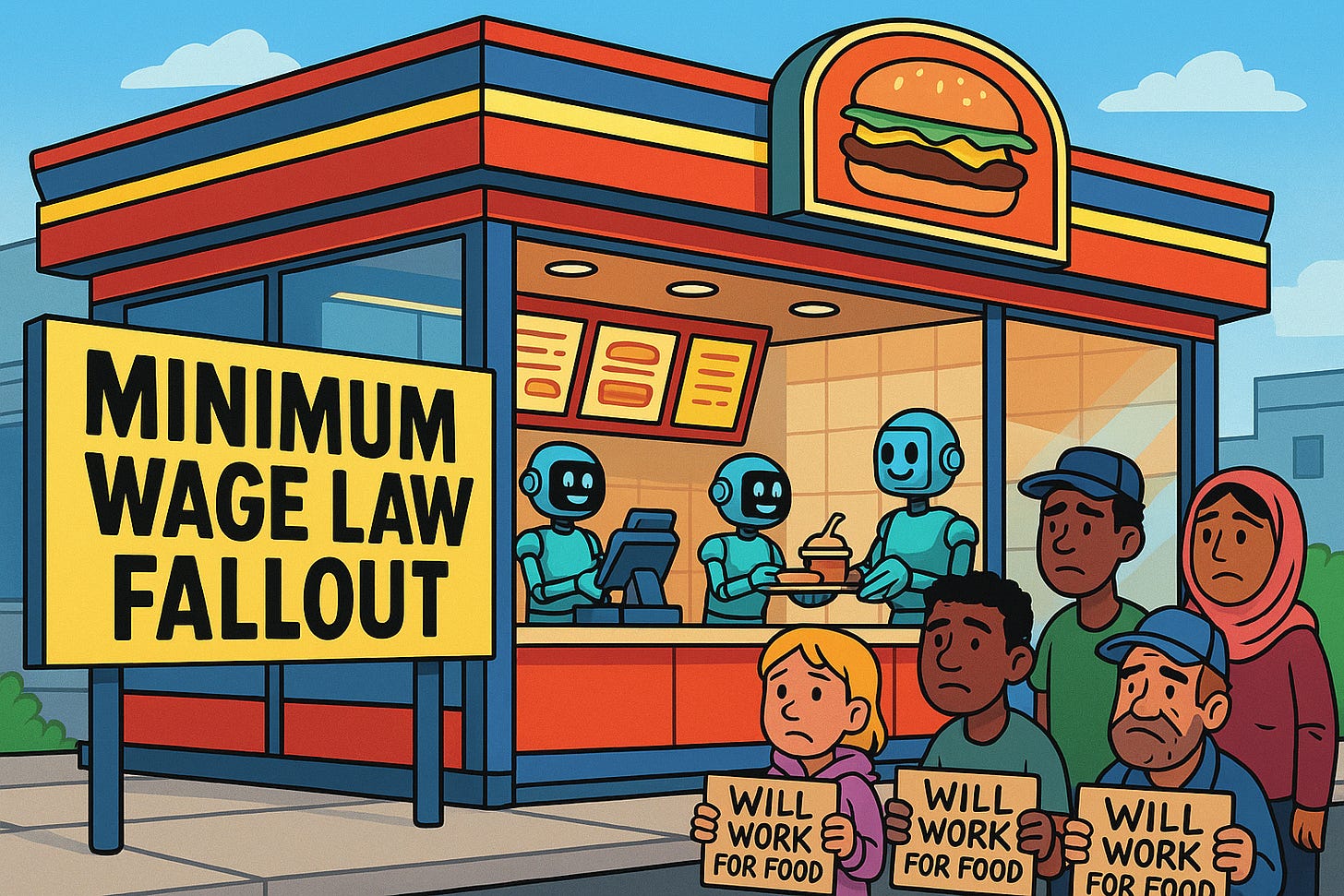Issue Tool Kit: The Top Eight Reasons Why Minimum Wage Laws Are a Terrible Idea
California’s $20 fast-food wage hike is squeezing jobs and jacking up prices, slamming small businesses and workers, studies show. How long until Sacramento stops meddling in the job market?
🕒 3.5 minutes
From time to time I write up these “Issue Tool Kits” to help people both gain a better understanding of complex issues, and also help them to be able to articulate the “why” when criticizing liberal policies. Enjoy!
California’s Costly Experiment
Picture Sacramento’s latest bright idea: a $20 minimum wage for fast-food workers, while the statewide minimum sits at $16.50. Cheered as a win for workers, it’s instead delivered a gut punch—job cuts, soaring prices, and small businesses on the ropes. In a state battling high living costs and economic uncertainty, these mandates sidetrack real solutions like fostering growth through less government interference. Here are eight reasons why minimum wage laws fail to deliver, hurting the very people they aim to help.
1. Boosting Unemployment Rates
Minimum wage hikes often price out low-skilled workers, reducing entry-level jobs. Studies show a 10% wage increase cuts teen and young adult employment by 1-2%. In California, the $20 fast-food wage led to 16,000 job losses since September 2023, per the Employment Policies Institute, though some studies report stable employment. Employers, unable to afford higher payrolls, hire fewer workers, leaving vulnerable groups sidelined.
2. Crushing Small Businesses
Small businesses, unlike big chains, operate on razor-thin margins. Forced wage increases lead to reduced hours, layoffs, or closures. California’s fast-food mandate sparked hiring freezes and scaled-back operations, with 70% of surveyed restaurants cutting staff. Rubio’s Coastal Grill shuttered 48 locations, citing high costs. This isn’t support—it’s a survival test that favors corporations over local shops.
3. Driving Up Prices for Everyone
When labor costs climb, businesses hike prices to survive. California’s wage increases have driven up food and service costs by 3-14.5%, studies say, leaving everyone, even minimum-wage workers, with less in their wallets. The promised “living wage” loses its shine as everyday expenses climb, trapping workers in a cycle where gains are offset by inflation.
4. Accelerating Automation and Job Displacement
Faced with higher wages, companies turn to technology. Kiosks and AI drive-thrus have replaced cashiers in California’s fast-food sector since the $20 mandate. Burger King franchisees rolled out self-service kiosks statewide. This shift eliminates jobs permanently, hitting unskilled workers hardest and widening the skills gap.
5. Failing to Lift People Out of Poverty
Most minimum-wage workers aren’t primary breadwinners; many are teens or part-timers in middle-class households. Hikes don’t target poverty effectively, often benefiting non-poor families while job losses harm low-income workers. Broader policies, like earned income tax credits, help more without these downsides, yet Sacramento sticks with blunt mandates.
6. Distorting Free Labor Markets
Government wage mandates meddle in deals between workers and employers, gumming up the works. They tilt the playing field toward unionized sectors, like California’s fast-food council, while small firms get the short end. This meddling picks winners and losers, ignoring regional economic differences and undermining market-driven wage setting.
7. Harming Vulnerable Groups Disproportionately
Minorities, immigrants, and youth face the brunt of reduced job opportunities. Minimum wages act as barriers, favoring experienced hires over those with less skill. In California’s diverse economy, these laws deepen inequality rather than alleviate it, locking out the very groups they claim to uplift.
8. Contributing to Economic Uncertainty
Wage mandates can fuel inflation and discourage business investment. California’s hikes have driven up food prices and slowed expansion for some firms, adding pressure to the state’s housing and cost-of-living crises. While not the sole driver, these policies exacerbate economic challenges without addressing root issues like overregulation.
So, Does It Matter?
In short, minimum wage laws burden employers, inflate costs, and fail workers, all while distorting markets. In California, where progressive liberals dominate public policy at the state level and in many big cities, this kind of common sense falls on deaf ears. But if California is going to move more in the direction of flourishing, these politicians better wake up to the value of dumping these kinds of arbitrary, authoritarian policies.



